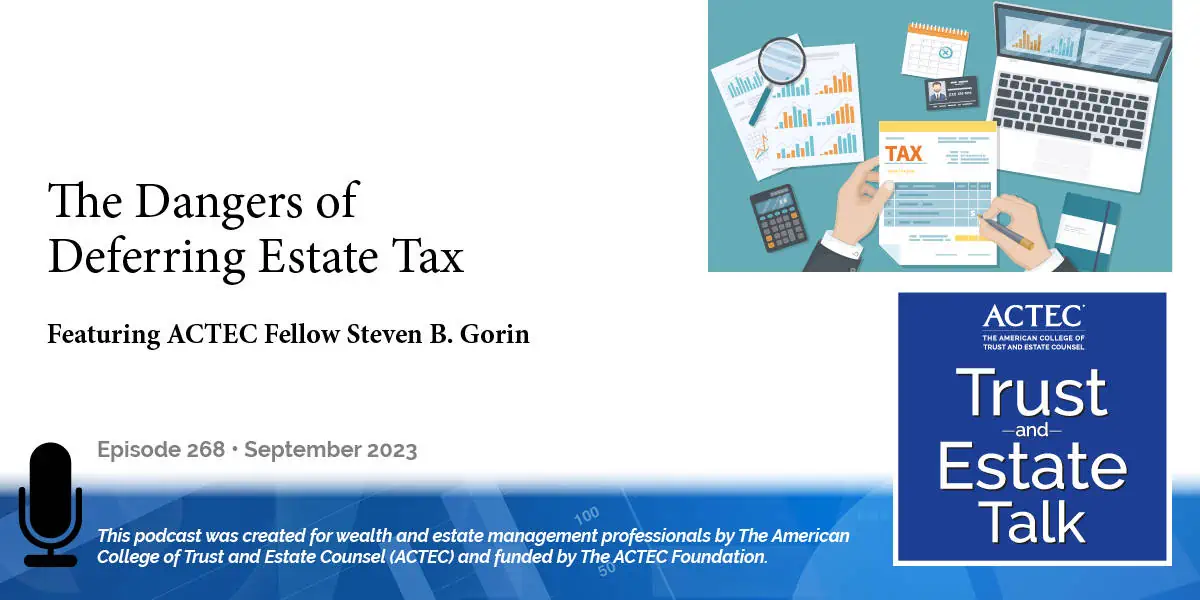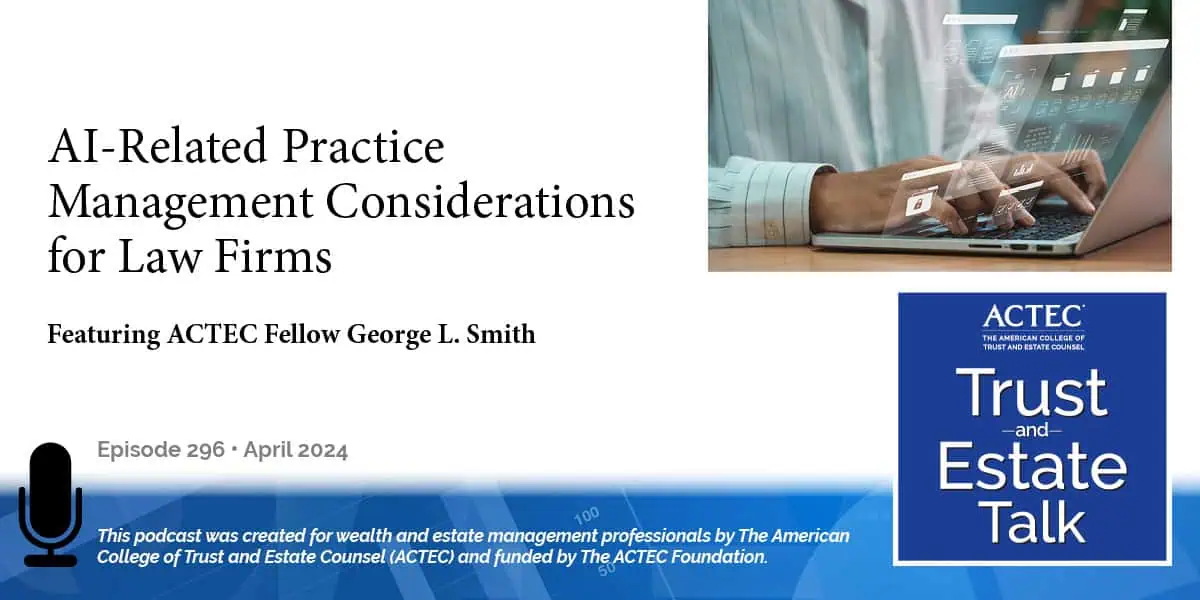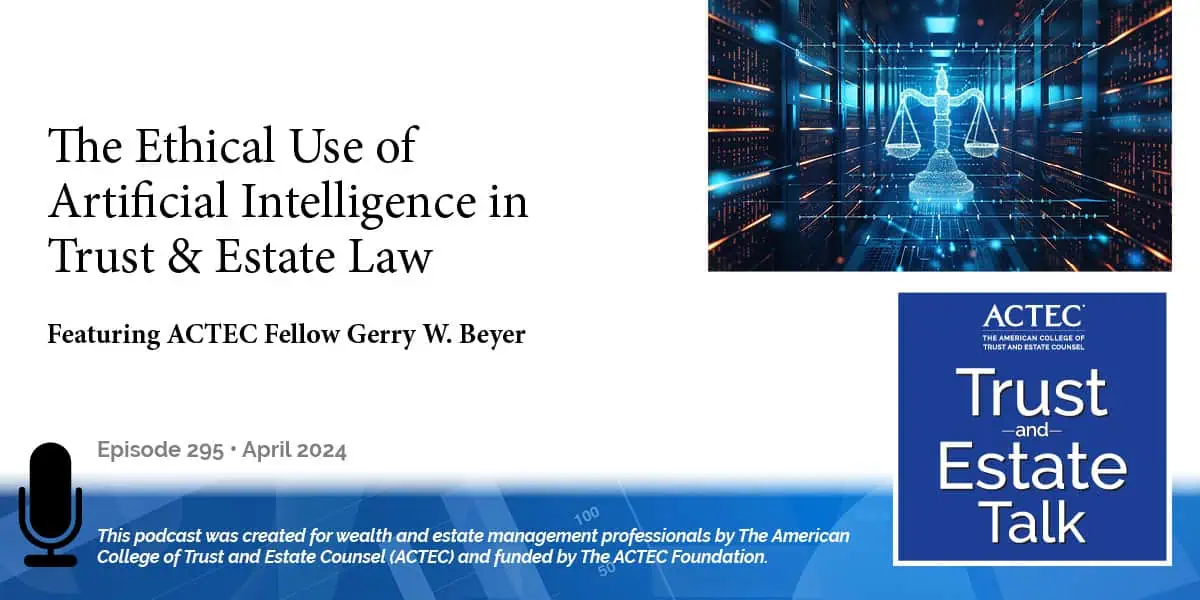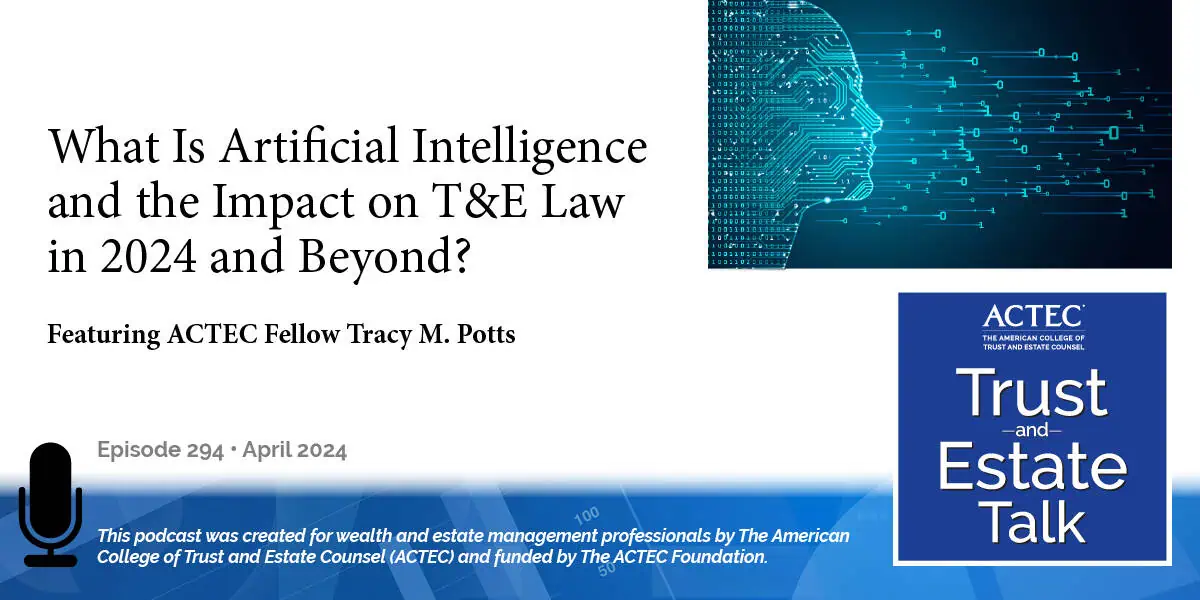The Dangers of Deferring Estate Tax

The “Dangers of Deferring Estate Tax”, that’s the subject of today’s ACTEC Trust and Estate Talk.
Transcript/Show Notes
This is Jim Milton, ACTEC Fellow from Tulsa, Oklahoma. Where the estate consists of qualifying business interests, Internal Revenue Code Section 6166 allows the estate tax to be paid over 14 years. Business owners tend to underestimate the impact of this deferral. Generating liens that can undermine the business’s ability to maintain or extend credit or surety bonds. ACTEC Fellow Steve Gorin of St. Louis, Missouri, joins us today to provide an overview of the liens that are involved and why business owners should seek to avoid relying on this deferral. Welcome, Steve.
Understanding the Dangers of Estate Tax Deferral
Thank you so much, Jim. So, when a decedent dies, because, of course, that’s what decedents do, and if there’s estate tax due, then a secret automatic estate tax lien under Code Section 6324 applies. This secret automatic estate tax lien is as of the date of the decedent’s death. It’s not recorded anywhere, and it applies to assets from a probate estate. Or let’s suppose the business was held in a revocable trust, then the majority opinion is that it also applies to the trustee of the revocable trust and the personal assets of the trustee of the revocable trust are subject to this secret automatic lien. And I will bet that 99.99% of trustees do not know they’re signing up for this when this situation occurs.
Unveiling the Hidden Tax Implications
So, you’ve got this secret automatic lien. And this secret automatic lien lasts for 10 years. Now, let’s say you’ve got this estate tax deferral, and so, you know, the estate tax is due nine months after the date of death. Then you have four years of interest, and then you have 10 years of principal and interest. And so, you’ve got this going on for 14 years and 9 months after the decedent dies. So, let’s think about this secret automatic lien and the fact that it lasts only 10 years, whereas the estate tax liability is getting paid over a period exceeding 14 years.
The Challenge of Prolonged Deferral
So, as you can tell, the IRS needs something to protect itself, you know, for the last four or five years. So, what the IRS does is, first, when a person claims this automatic extension of time to pay, the IRS will look at the creditworthiness of the estate. Does it look like it can all pay it back fine? And generally, it assumes that it will be paid back okay.
And then, after several years go by, I think about six now, the IRS will take another look and say, “OK. We know that there’s going to be a gap coming up here. What do we think about securing these payments over the gap? Do we think the estate’s fine and we don’t need to do anything special to secure that gap, or do we think we need to get a lien on some assets to help secure for that gap?”
Now, the IRS used to automatically say, “I’m getting that lien.” And then in the case called Roski, R-O-S-K-I, the Tax Court slapped down the IRS and said, “You have to exercise your discretion and evaluate whether you think that lien is necessary.”
IRS Safeguards and Asset Liens
So, along comes the IRS – and the other thing that goes along with this is that the Treasury Inspector General for Tax Administration or TIGTA also said to IRS, “Well, you’ve been letting these things go and not protecting yourself well enough.”
So, we had a little mixed signal the IRS was getting between the TIGTA people saying, “You’ve got to watch out and collect that tax,” and the tax court saying, “You’ve got to exercise discretion and not be too harsh on taxpayers.” So, basically, it comes down that the IRS does have to look at things, but generally, the IRS is going to want to get a lien imposed on some assets.
Impact on Business Credit
Now, the tax laws allow the executor of the estate, which may be the trustee of the revocable trust, to select which assets are used to satisfy that lien. So, a lot of times, the IRS will say, “Hey. Let’s suppose you have this operating business here. Give me a lien on the operating business’s real estate.” And the executor or trustee’s response would be, “Sorry. The real estate is not what was included in the estate. It was the business interest itself that was included in the estate. So, yeah, I’ll give you a lien on my stock or my LLC or partnership interest or whatever that is, but I’m not going to give you a lien on that real estate.” So, the trustee or executor is allowed to do that if they’re counseled well enough to know that they can resist when the IRS asks to get something it’s not entitled to.
So, then you get this express lien that gets attached to this business interest. So, we have the secret automatic lien that nobody even notices, and then you get this express lien. So, why do we really care about all of this? Well, most businesses have a line of credit that they use to finance their inventory, or finance their other operations, or finance their accounts receivable. Or maybe, if you have a construction company, they have a surety bond. And basically, those lenders or bond companies are looking at the business’s credit, and they also look at the credit of the owners of the business.
Alternatives to Estate Tax Deferral
And they often have these various debt covenants that say, “Hey. You have to have your financial statement looking a certain way that’s really solid because we want to make sure that you’re going to pay us and that you’re obligations to other people are not going to interfere with that.” So, each time you are applying for credit, technically, the trustee or executor needs to disclose the secret automatic lien that they might not even know about, and certainly when you have a lien that actually appears in the public records when the IRS is going back to secure the estate tax down the road. I mean, that’s definitely going to appear in the records.
And so the lender or the bond company might be a little bit upset that the finances of the executor or trustee are not quite what they thought they would be. So, you could get your line of credit yanked, or you could get your surety bond yanked. Of course, a construction company without a surety bond, where do they go? They go out of business.
So, think really hard before relying on this estate tax deferral. Instead, do some of the tools that ACTEC Fellows often use to try to get businesses outside of the estate tax system. And in the meantime, while you’re using those tools, consider getting some term life insurance to fill the gap until those assets are actually outside the estate tax system. I hope this has been helpful and will help you protect your clients and help their loved ones.
Thank you, Steve, for this great information and the warnings about the super-secret IRS liens. We may be the only people talking about that today, but I’m delighted to have talked about it with you. Thank you.
You may also be interested in:
- Relief for S Corporation Mishaps (Mar 2023)
- Modernizing Section 6166 (Aug 2021)
Latest ACTEC Trust and Estate Talk Podcasts

AI-Related Practice Management Considerations for Law Firms
A discussion for law firms about how to incorporate AI in their practice management, including staff considerations, the “billable hour,” and more.

The Ethical Use of Artificial Intelligence in Trust & Estate Law
A law professor offers insights into the risks, rewards, duties and ethical considerations of lawyers using AI in their T&E practices.

What Is Artificial Intelligence and the Impact on T&E Law in 2024 and Beyond?
A primer on the types and uses of AI, then a deeper dive into the impact on trust and estate law from types to applications to ethical considerations.

